Every author wants to sell more books and reach more readers. Today, the Alliance of Independent Authors is featuring a new infographic about world reading habits from Global English Editing, summarising key research about global reading habits and what readers want from writers in 2022.
Looking at reading trends in America and around the world in 2021, recent research from Global English Editing and Written Word Media reveals many interesting facts about reader habits and inclinations, useful when thinking about what readers want from writers in 2022.
What Readers Want: Format
Print Books and Ebooks
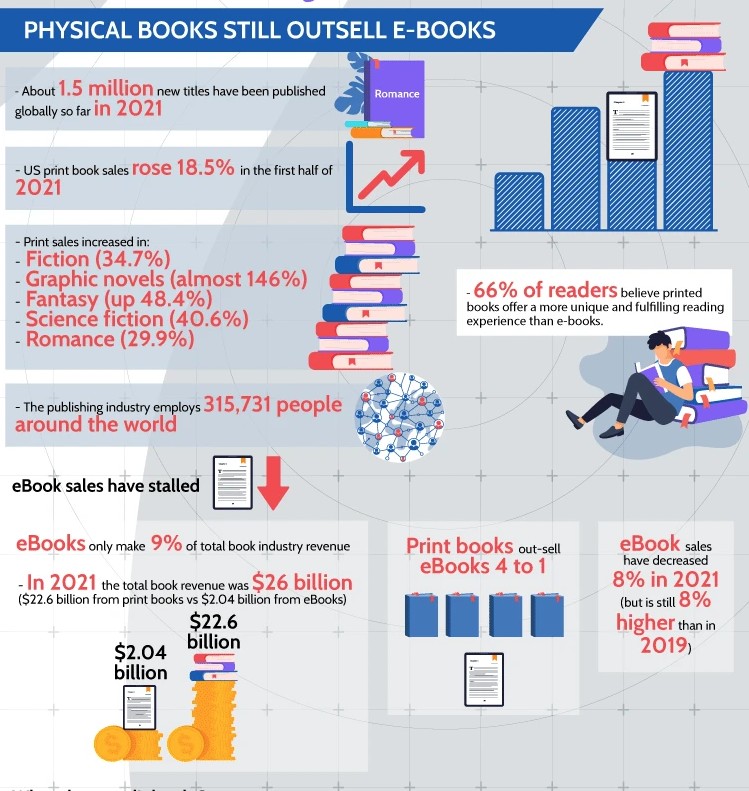
Though ebooks and audiobooks are increasingly popular, print books continue to trump in the researched book market, with 66% of readers across the globe saying print offers “a more fulfilling and unique reading experience”.
- Over 1.5 million book titles published in 2021, with printed book sales increasing by 18.5% during the first half of the year.
- 2021’s total book revenue generated $26 billion, of which ebooks generated 9%. Overall, ebook sales declined marginally by 8%.
- 2021 saw ebook sales decline by 8%, with print books outselling ebooks 4 to one.
The knowledge that lots of ebook and digital audiobook sales are uncounted must temper these figures. The research does not include authors selling directly to readers and those who sell ebooks and audiobooks without an ISBN. Nonetheless, the resilience of print is clear.
- Sales of print books rose strongly in the UK: some 202m paperbacks and hardbacks sold in the UK in 2020, according to industry figures, the first time they passed the 200 million mark since 2012.
- In the US, where sales of print hit 751 million last year, the highest figure since 2009.
Audiobooks
The most significant player in the audiobook market is Audible, offering over 200,000 titles on their platform.
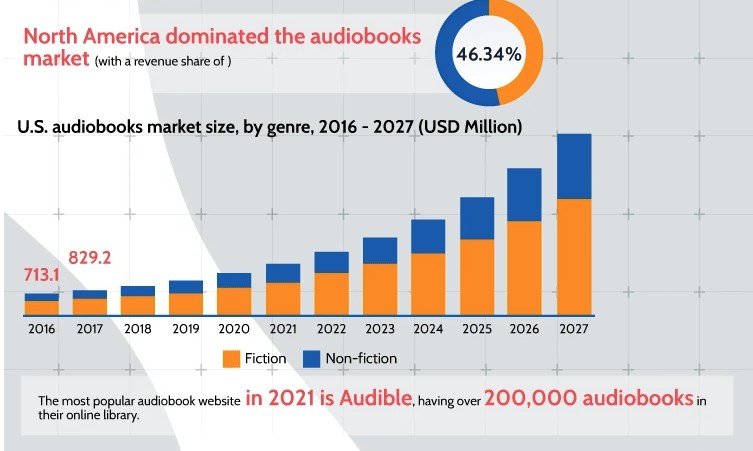
What Readers Want: Genre
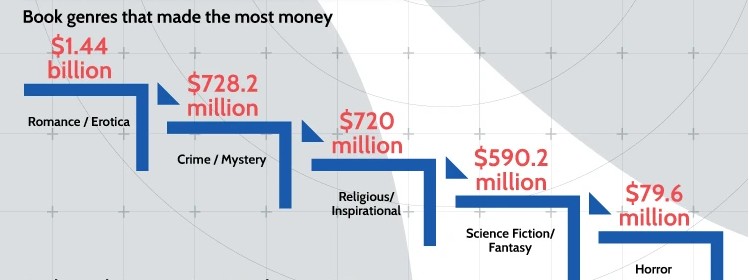
When looking at the various genres and sales volumes, fiction, romance, fantasy, and sci-fi topped the list, across the globe.
- Romance continues to dominate and is still the most profitable fiction genre worldwide.
- Crime/ Mystery comes in second place, with religious and Inspirational titles leading the way in most popular non-fiction.
- The adaptation of books into blockbuster TV series and movies is growing and having an influence on the book market
- The most considerable increase, by far, was in the genre of graphic novels, sales of which rose by a staggering 146%.
Do Readers Prefer Books in a Series or Standalone Books?
Publishing a series of makes it easier for author sand publishers make a profit. Offering the first book in a series for free or low-cost is a great way to attract new readers and when hooked, they will want to read the rest of the series. But how do readers feel? It seems most are indifferent. Written Word Media research found that:
- 14% of readers said they prefer a series
- 26% said they prefer standalone books
- 60% said they have no preference.
This means that whichever way works for you, will work for a majority of readers, so long as each book in the series fully wrapped up, before leading into the next. Readers were adamant that they dislike cliffhangers at the end of a book.
What Readers Want 2022: Good Metadata
When reading a series, readers want to find the following books in the series easily. They also want good book descriptions and other metadata.
No reader is out there saying “give me good metadata”, but it is metadata that tells readers why a particular book is one for them. This includes the title, author, publisher, format and ISBN but especially the less factual metadata: genre, categories, cover and book description.
For readers, the book description is what's most important. “When asked to rank the importance of several factors when choosing a book,” says Written Word Media, “57% of readers surveyed said the book description was the most important factor. Next most important was price at 37% and author at 23%.
Readers want accurate descriptions of what a book is about…not clever cover copy that leaves them wondering. There's a big difference between a “romance novel” and a “Regency romance”, for example. A thriller and a cosy mystery. A serious story and a light-hearted comedy. A book set in Manhattan and in rural Iowa.
Your description is key to attracting the right readers and setting the right expectations.
Covid-19 and Lockdowns Impact on Reading Habits

Covid-19 decimated almost every industry, and the education, publishing and bookselling sectors were no exception. Forced school closures and disruptions led to over 100 million children across the globe falling below the minimum proficiency level in reading. Developing nations particularly saw a decrease in the literacy rate in 2021.
Issues such as the lack of technology, power disruptions, and the costs associated with online schooling were the most significant factors. These unprecedented numbers are likely to rise with the discovery of new coronavirus variants.
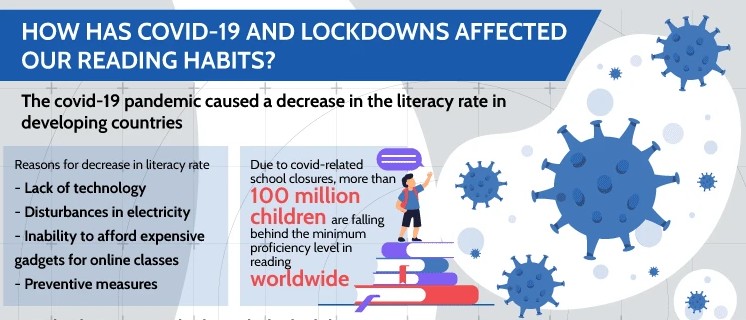
On the bright side, the pandemic helped thousands to rediscover their love of books.
35% of people in the world have read more books than usual since COVID began. More people at home, out of work, searching for meaning, means more reading.
Research by the UK Reading Agency found 1 in 3 adults reading more during lockdowns, rising to almost one in two (45%) 18-24-year-olds.
What Readers Want 2022: Readers in the United States
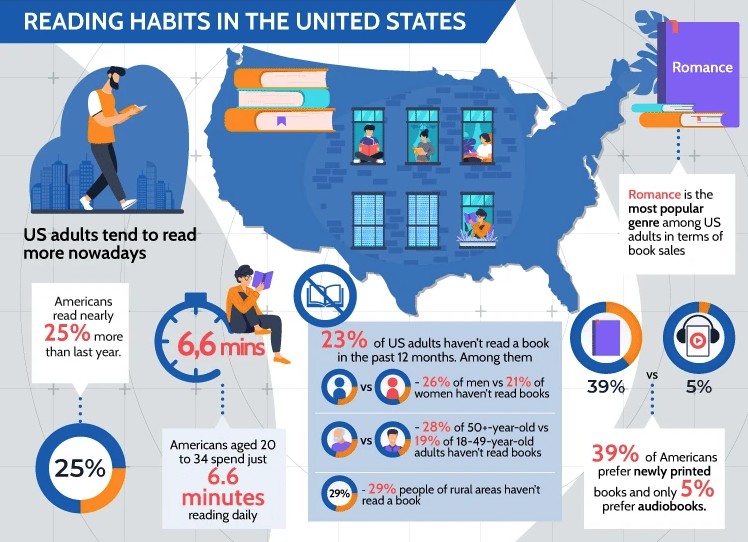
Americans are reading more than before, 25% more when compared to the previous year (2020) but the trend is not uniform. Although some US citizens are consuming more books, 23% of Americans haven’t picked up a single book in the past year. In addition, 29% of rural Americans have never read a book.
- Americans aged between 20 and 34 spend an average of 6.6 minutes reading per day.
- The popularity of audiobooks is rising, with North American dominating with a market share of over 46% of the global audio market.
- Printed books are still the preference of 39% of the population, with only 5% opting for audiobooks, so the potential for audiobook growth –in the US and globally–is huge.
- Romance remains the biggest-selling genre in the USA.
What Readers Want 2022: Readers in Europe
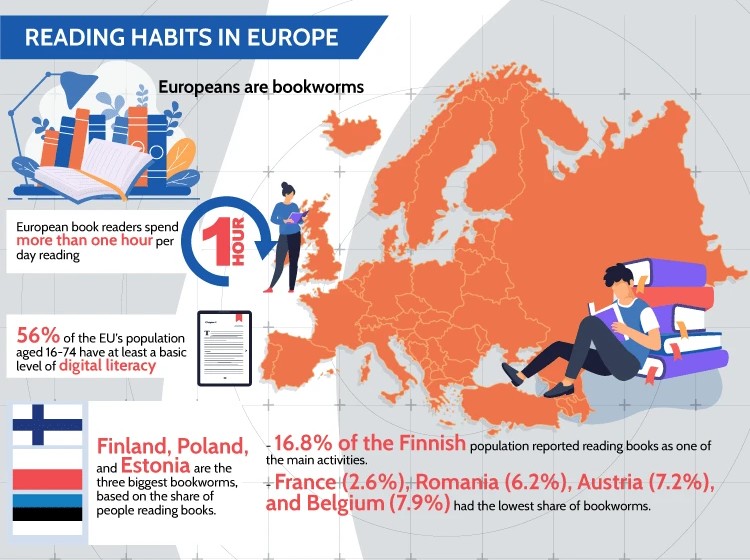 Europeans are the world’s biggest bookworms and spend at least one hour each day reading. Most households in the European Union spend more on books, newspapers and stationery than they do on package holidays.
Europeans are the world’s biggest bookworms and spend at least one hour each day reading. Most households in the European Union spend more on books, newspapers and stationery than they do on package holidays.
Digital literacy is rising rapidly in Europe, with at least 56% of Europeans aged between 16-74 having basic digital literacy.
- Finland, Poland, and Estonia harbor the most significant number of Europes readers, with 16.8% of Finnish citizens claiming reading to be their favorite pastime.
- Adults in Estonia top a list of countries where people spend the most time reading.
- France, Romania, Austria, and Belgium have fewer bookworms compared with the rest of the EU.
What Readers Want 2022: Readers in Asia
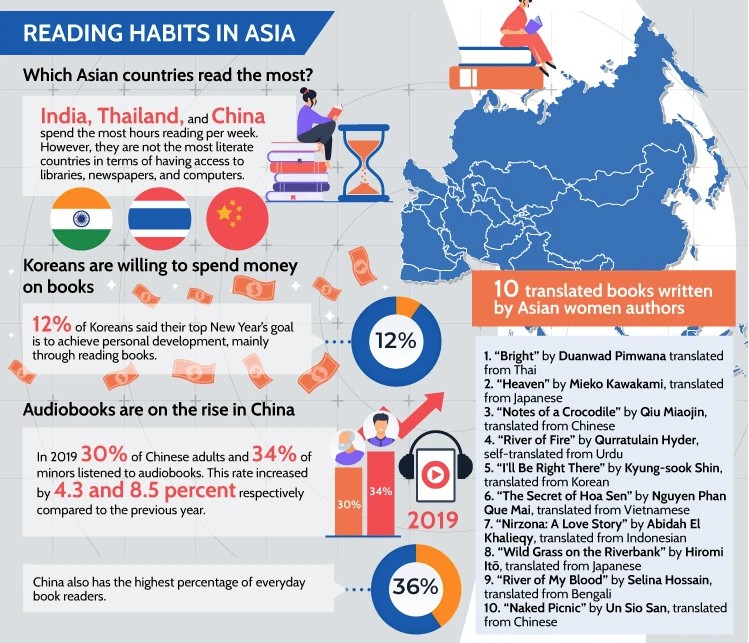 Readers in India, China, and Thailand are the Asian readers who spend the most time reading. However, although they read most frequently, they are not the most literate, due to limited access to libraries, newspapers, and computers.
Readers in India, China, and Thailand are the Asian readers who spend the most time reading. However, although they read most frequently, they are not the most literate, due to limited access to libraries, newspapers, and computers.
- In China, audiobooks are trending, popular among youth and older generations, with numbers steadily rising. In 2019, 30 % of adults and 34% of minors regularly used audiobooks. China also has the highest percentage of readers of other book formats.
- Koreans spend lots of money on books! 12% of Koreans have made personal development a new year's resolution and use books as their preferred medium for learning.
- Asian female authors are producing attracting a lot of attention at the moment and being translated into English
What Readers Want 2022: Readers in Africa
Reading is the fifth most popular leisure activity in Africa, with 7 out of every ten adults claiming that they read for leisure.
Although it’s encouraging to see adult literacy rates increasing year on year, the rise is marginal and literacy levels in sub-Saharan Africa are still well below the global average of 86%.
Forty-two percent of households in South Africa, for example, own one or more books, and 7 % of the South African population own more than ten books, still there are more than 16 million South Africans who don’t own a single book. That equates to almost 58% of the population.
What Readers Want: Global Literacy by Generation
Global literacy for 2021 was 86%, with women having higher illiteracy rates than males. Across the generational spectrum, 61% of readers prefer non-fiction over fiction.
- East Asia and the Pacific have the world's highest literacy rate (95.7%) compared to sub-Saharan Africa, which has the lowest rate (65.47%).
- Overall literacy in first-world nations continues to rise, with countries like Luxembourg, Andorra, and Norway reporting 100% literacy rates.
- Guinea, Niger, Djoubite, Kiribati, and Niue are the least literate nations.
- Africa’s literacy rate remains low. One in three African adults cannot read, and a staggering 48 million people aged between 15-24 are illiterate.
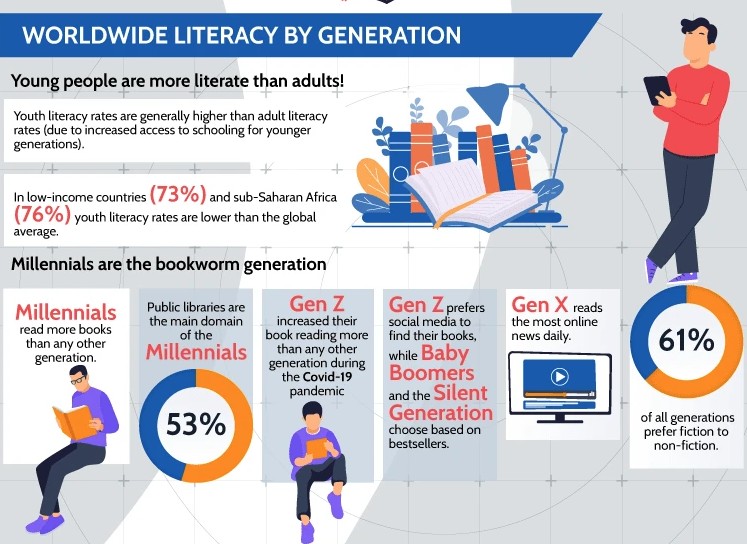
Across the world, young people are more literate than adults, thanks to more schools and early child development programs being made available to the younger generations.
When looking at the reading habits by generation, some noteworthy trends include:
- Millennials dominate in book reading and mainly use libraries to source reading materials.
- Gen-X consume their reading maternal, mainly news, online.
- Gen-Z has made the most significant improvement in reading more and uses social media to hunt for top reads.
- Boomers and the Silent generation choose reading materials based on bestseller lists
What Readers Want 2022: The Relevance of Libraries
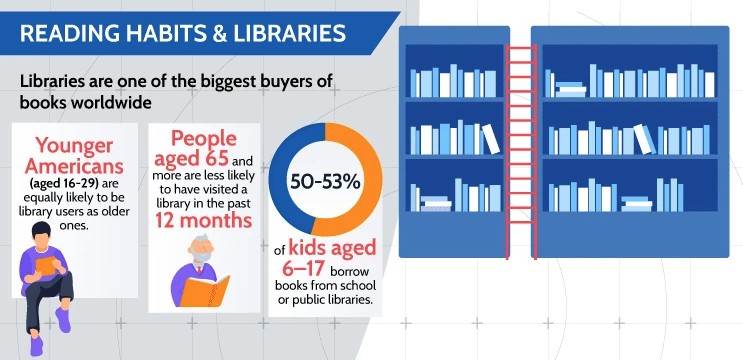 Libraries are the biggest buyers of books globally and libraries are as popular as ever, making them a good discovery vehicle for your book.
Libraries are the biggest buyers of books globally and libraries are as popular as ever, making them a good discovery vehicle for your book.
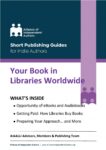 ALLi created the Your Book in Libraries to help self-publishing authors get their books into libraries. ALLi members can download a free copy of the short guide by logging into allianceofindependentauthors.org and navigating to PUBLICATIONS > SHORT GUIDES. If you’re not a member, you can download a copy in our bookshop here.
ALLi created the Your Book in Libraries to help self-publishing authors get their books into libraries. ALLi members can download a free copy of the short guide by logging into allianceofindependentauthors.org and navigating to PUBLICATIONS > SHORT GUIDES. If you’re not a member, you can download a copy in our bookshop here.
In the US, both young and old use public libraries, with statistics revealing that more than half of age groups 6-17 utilize libraries to source books.
What Readers Want 2022: Conclusion
Each person who reads a book does so with a purpose: to get something out of it. That something might be information, inspiration or entertainment. The best books deliver all three and as writers, we need to know which of these is central, so we can get our books descriptions and metadata right.
Readers across the world continue to want the inspiration, education and entertainment that only a book can provide. Despite Covid challenges, books have proven their staying power and continue to hold their special place in the minds and hearts of both young and old, across the world.
Global English Editing is an online-only editing and proofreading service that specialises in editing work for students and academics, businesses and professionals and authors of all kinds, and aim to provide a “flexible, efficient and truly international” service. Find out more here.
Sources
- https://www.penguin.co.uk/articles/2021/may/best-books-of-lockdown.html
- https://www.businesswire.com/news/home/20210413005675/en/Global-Book-Publishers-Market-Report-2021-to-2030—COVID-19-Impact-and-Recovery—ResearchAndMarkets.com
- https://en.unesco.org/sites/default/files/ild-2021-fact-sheet.pdf
- https://ourworldindata.org/literacy
- https://www.worldatlas.com/articles/the-highest-literacy-rates-in-the-world.html
- https://worldpopulationreview.com/country-rankings/literacy-rate-by-country
- https://www.ibisworld.com/global/market-size/global-book-publishing/
- https://www.grandviewresearch.com/industry-analysis/audiobooks-market
- https://www.publishersweekly.com/pw/by-topic/industry-news/bookselling/article/86061-the-print-books-sales-surge-continues.html
- https://proactivewriter.com/blog/how-to-pick-a-genre-for-your-book-what-is-the-most-popular-best-selling-book-genre
- https://worldpopulationreview.com/country-rankings/literacy-rate-by-country
- https://www.tonerbuzz.com/blog/paper-books-vs-ebooks-statistics/
- https://www.insider.com/benefits-of-reading
- https://www.education.pa.gov/Teachers%20-%20Administrators/Curriculum/ELA/Pages/Infographics.aspx
- https://fortune.com/2021/08/21/rom-com-pandemic-book-sales-romance-bookstore-day/
- https://timesofindia.indiatimes.com/readersblog/impact-of-covid-19-on-the-literacy-rate/impact-of-covid-19-on-the-literacy-rate-33138/
- https://www.news-journalonline.com/story/news/2021/11/03/10-most-borrowed-books-volusia-libraries-during-pandemic/6093005001/
- https://www.oprahdaily.com/entertainment/g34863788/books-being-made-into-movies-2021/
- https://www.statista.com/statistics/299074/book-consumption-per-capita-print-ebook-usa
- https://www.wordswithoutborders.org/dispatches/article/11-translated-books-by-asian-women-writers-to-read-this-witmonth
- https://africacheck.org/fact-checks/reports/do-only-14-south-africans-read-books

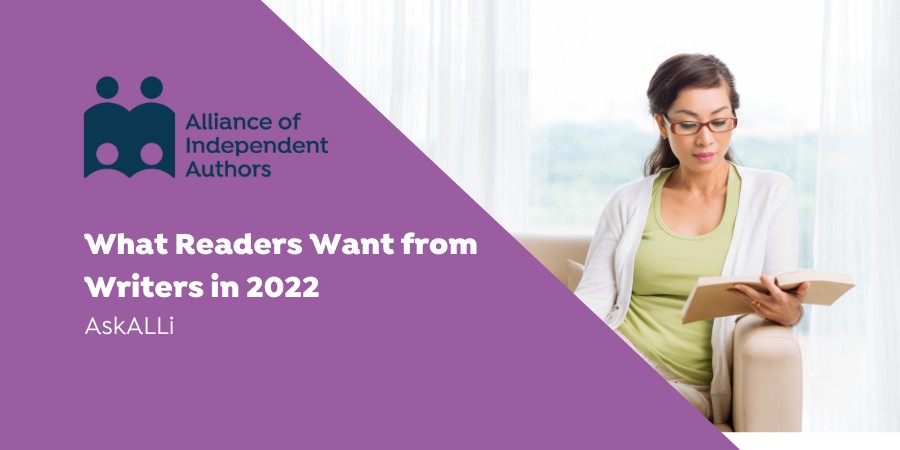
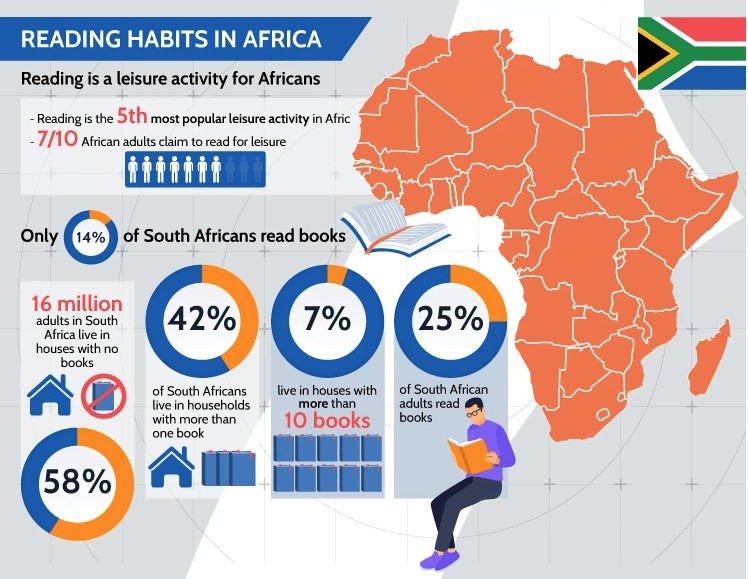


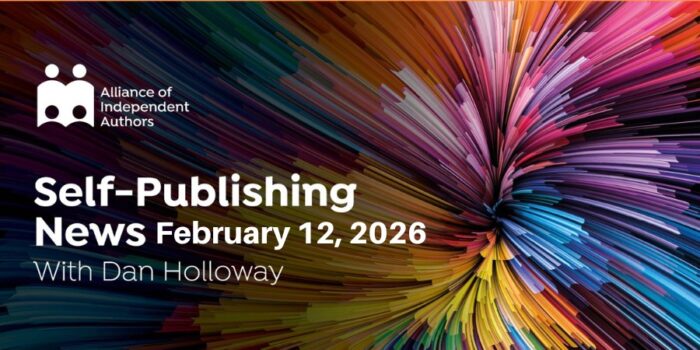
This article offers valuable insights into the evolving expectations of readers in the ever-changing landscape of literature. The article sheds light on the shifting trends and preferences that have emerged among readers, serving as a useful guide for writers seeking to connect with their audience. It emphasizes the growing demand for diverse and inclusive narratives that reflect the richness of human experiences and provide representation for marginalized voices.
Real readers are chaotic beings with chaotic lives. I took note of my acquaintance who solely listens to audiobooks. There are a lot of readers in my world that are like this, I’ve found. They are mothers who work full-time so frequently. mothers who have to endure annoyingly long commutes in Los Angeles. We frequently spend two to three hours a day alone because there is little access to public transportation in our area. locked inside the warm sanctuary of our automobile.
As a writer I’ve observed that, Some readers will be drawn to books that are lighter or that otherwise allow them to forget about problems in the world while reading. Romance is always a popular genre and will likely remain so, and fantasy books will likely remain popular for their escapist reading experience as well.
The writing tips themselves are all excellent. Some of it is well phrased and can cause you to have a small epiphany, but other parts are relatively common advice that you can get from any writer or editor. As always, there is no secret to becoming a great writer or creating a compelling story, and you should never believe anyone who claims there is. However, there are some abilities you can learn and practice. The attraction, in my opinion, lies in King’s candour and straightforwardness; this book is full of excellent counsel and contains no fluff or false hope.
ajf5ou
Why could Orna Ross not hear me last time I took par in her ZOOM meeting; she appeared exasperated about it but has stll not followed up to identify why for rectifications – I have not had this problem with other ZOOMING communications.
This problem appears to be at the Alli end not my end!
My first book/novello is progressing with a publisher.
I want to try out my second book via Alli’s real self-publishing path?
Still fully paid-up Alli Member No. 11130
Society of Authors Member No. 68230
Hi Seton, I’m not sure why it happened. I wasn’t exasperated with you, just unable to hear you (everyone else was loud and clear). The workshop was on Zoom, not an ALLi platform, so that’s where you’d have to follow up if you wanted to find out why–though I think that would be close to impossible at this point. You can ask your question any time in Patreon or through the ALLi support desk.
The lack of books in African homes is concerning but understandable given dire circumstances (lack of food, basics, etc.). Also disturbing among the USA data is the fact that 29% of rural households have NEVER read a book. With all the crazy conspiracy theories that swirl around on social media and the decline of book reading (aka, verifiable, factual, sourced data) might there be a connection here?